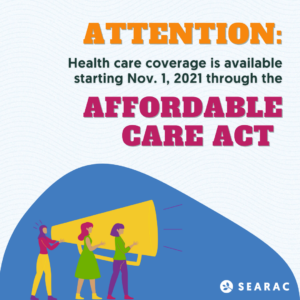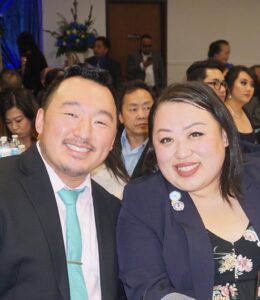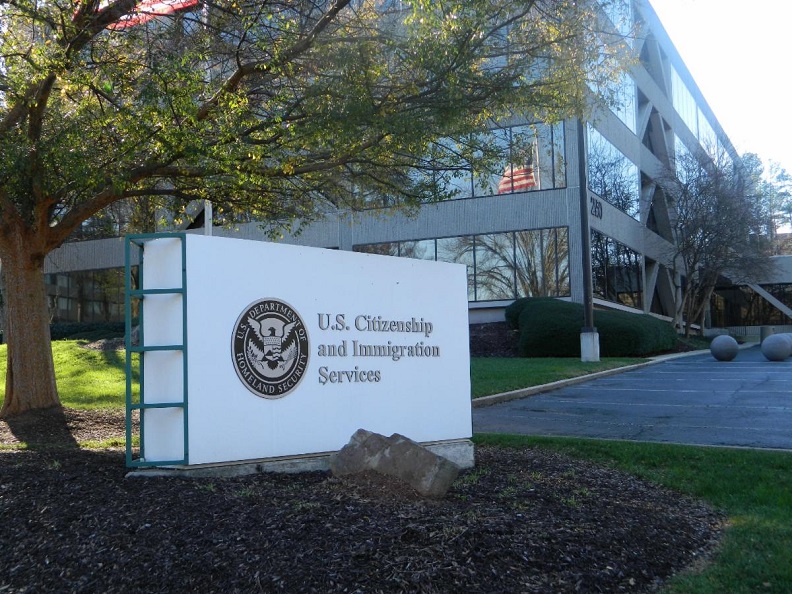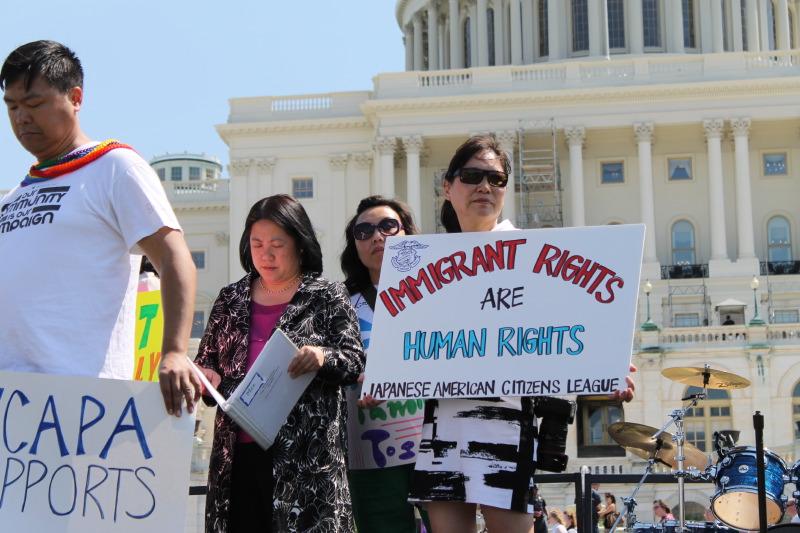SEARAC Responds to President Biden’s Build Back Better Framework
For Immediate Release:
November 2, 2021
Media contact:
Jenna McDavid
Communications and Development Manager
jenna@searac.org
202-601-2972
Washington, DC – On Oct. 28, President Biden released his Build Back Better framework. SEARAC welcomes the many initiatives that would improve the lives of Southeast Asian Americans. In particular, SEARAC supports the following education, health, and immigration related proposals:
- Increased Pell grants and access to financial support for recipients of Deferred Action for Childhood Arrivals (DACA);
- Increased funding for Minority Serving Institutions (MSI) and minority teacher investment;
- $150 billion for homecare support and assistance to seniors and individuals with disabilities;
- Reduction of Affordable Care Act healthcare premiums and Medicaid expansion to include hearing; and
- Pathway to citizenship and recapturing of unused family visas to address backlogs in the family immigration system.
While SEARAC is pleased with the BBB framework, we are disappointed that the framework excludes debt-free two year college; decreases homecare support from the original $400 billion proposal to $150 billion; excludes dental and vision from Medicaid expansion; and does not include lower prescription drug pricing.
“President Biden’s Build Back Better framework is a significant step forward in addressing many of the challenges faced by Southeast Asian Americans,” said Quyen Dinh, Executive Director of SEARAC. “This plan will improve care provided to our elders and their ability to access culturally and linguistically appropriate services, while increasing support for their caregivers. Likewise, the education investments would increase the ability of our students to access higher education while also supporting efforts to diversify our nation’s teachers. As Congress continues to negotiate the text for Build Back Better, we urge our elected officials to include language providing citizenship to as many immigrants as possible while also including language that will decrease the years-long wait many Asian Americans endure while their family members languish in the family visa backlog. We remain committed to working with the White House and Congress to pass a bill that will significantly improve the lives of Southeast Asian Americans.”
The House Rules Committee recently released the text of the bill, and the House is expected to vote on the bill this week. Additionally, the bill is expected to reach the Senate floor by late November.
UPDATE 11/3/2021: House Speaker Nancy Pelosi indicated today that Paid Family and Medical Leave will be included in the Build Back Better framework. Additionally, Speaker Pelosi shared the following yesterday regarding lowering prescription drug costs: “Democrats will deliver strong drug price negotiations to lower prices for our seniors and halt Big Pharma’s outrageous price hikes above inflation, not just for seniors but for all Americans. For seniors, we have also reduced out-of-pocket co-pays and created a new $2,000 out-of-pocket limit for seniors’ expenses in Medicare Part D.”
2022 ACA Open Enrollment Period Begins!
 Nov. 1 marks the beginning of the 2022 Affordable Care Act (ACA) healthcare marketplace open enrollment period. As COVID-19 cases continue to surge in the United States, SEARAC encourages uninsured individuals and those seeking to renew or change their healthcare coverage, to enroll as soon as you are able. Residents of most states can enroll at healthcare.gov. If you live in one of the below states, you should enroll through your state’s marketplace:
Nov. 1 marks the beginning of the 2022 Affordable Care Act (ACA) healthcare marketplace open enrollment period. As COVID-19 cases continue to surge in the United States, SEARAC encourages uninsured individuals and those seeking to renew or change their healthcare coverage, to enroll as soon as you are able. Residents of most states can enroll at healthcare.gov. If you live in one of the below states, you should enroll through your state’s marketplace:- California: Covered CA
- Colorado: Connect for Health Colorado
- District of Columbia: DC Health Link
- Idaho: Your Health Idaho
- Maryland: Maryland Health Connection
- Massachusetts: Massachusetts Health Connector
- Minnesota: MNSure
- Nevada: Nevada Health Link
- New Jersey: Get Covered New Jersey
- New York: New York State of Health
- Pennsylvania: Pennie
- Rhode Island: Health Source RI
- Vermont: Vermont Health Connect
- Washington: Washington Health Benefit Exchange
SEARAC Statement on the Confirmation of Amy Coney Barrett to the Supreme Court
Header photo by Fibonacci Blue
October 27, 2020
With COVID-19 currently reaching new daily record numbers of cases in the United States and more than 200,000 lives lost, it is shameful that Senate Republicans would prioritize a rushed confirmation of Justice Barrett to the Supreme Court rather than a much-needed financial aid package for the millions of Americans who are feeling the impacts of this pandemic. Further, Justice Barrett’s confirmation occurring so close to the election flies in the face of statements made previously by Sens. Mitch McConnell, Lindsey Graham, and others, who declared that they would not vote on Judge Merrick Garland in 2016.
In addition to our concerns about the process of this confirmation, SEARAC also opposes Justice Barrett’s confirmation because of her ideology. “The confirmation of Amy Coney Barrett to the Supreme Court threatens civil rights in this country for a generation,” said Katrina Dizon Mariategue, Acting Executive Director of SEARAC. “Her previous decisions all signal her willingness to rule regressively on immigration, abortion rights, LGBTQ+ issues, and the Affordable Care Act in the highest court of the land. Southeast Asian Americans will be profoundly impacted by her confirmation, and we are heartbroken over this process and this confirmation vote.”
We share our communities’ rage, grief, and anxiety around this confirmation, but we urge action: by voting in the 2020 election, we can ensure that our representatives in Congress and in the White House reflect the will of Southeast Asian Americans.
Honoring Marny Xiong’s Legacy in Our Fight for Culturally Competent Healthcare

By Kham S. Moua
COVID-19 has killed over 220,000 Americans, including my cousin. At 31, Marny had just started her tenure as Chair of the Saint Paul School Board. She was intelligent, beautiful, and ambitious, but most of all, she was kind and compassionate. While I was often a wallflower, Marny always dazzled the room. At family reunions and community gatherings, she would easily maneuver between Hmong and English, bring the young and the old together in conversation, and discuss why our communities needed to work within and without to progress the rights of all students.
In the days leading up to her death, she was a shell of her former self. She could not speak or laugh; the only sounds emitting from the screens of our laptops were the cries of our family and the humming of the ventilator breathing for her. Her death devastated my family. Marny and her father were admitted to the emergency room at separate hospitals on the same day, and while he survived, my uncle continues to experience complications from the virus. His COVID-19 treatment cost over $200,000. While his health insurance covered his treatment, many uninsured Americans will survive this pandemic, endure prolonged health effects, and face an insurmountable financial hurdle.
On Nov. 10, the Supreme Court will hear oral arguments in California v. Texas, a case seeking to strike down the Affordable Care Act (ACA) led by 20 Republican state attorney generals with the backing of the Trump Administration. If the Court decides to repeal the ACA, 20 million people will lose their health insurance, and millions more will be at risk of losing or being denied coverage due to pre-existing conditions, which may eventually encompass COVID-19.
According to the Census Bureau, the uninsured population in the United States increased from 8.9% in 2018 to 9.2% in 2019, meaning an additional one million people became uninsured last year. Similarly, the uninsured Cambodian, Hmong, and Vietnamese population also increased in 2019, with a 0.8% uptick among Cambodians, 0.6% among Hmong, and 1% among Vietnamese Americans. In spite of this data and the pandemic, the Administration continues to support the repeal of the ACA. Officials even shortened the open enrollment period for 2021 from 90 days to 45 days, which opens on Nov. 1 and ends on Dec. 15, 2020. This pandemic has taught us that our country needs to protect the ACA and expand healthcare access, not strip insurance from millions of people.
Isolated, unable to speak English, and recovering from a speech impediment due to a prior stroke, our grandmother could barely ask for water and couldn’t even request food or to use the restroom. We created spreadsheets and staggered video calls to make sure that someone who spoke English and could understand Hmong was always present.
However, for Southeast Asian and other minority communities, increasing healthcare access alone is not enough. Culturally and linguistically competent care is also necessary to ensure that our communities thrive. According to the 2019 American Community Survey, 32% of Southeast Asian Americans are limited English proficient (LEP), while only 8% of the general US population is LEP. It’s imperative that our healthcare services have robust language access support.
While Marny’s family prepared for her funeral, our grandmother was also hospitalized for COVID-19. To my family’s pleasant surprise, she survived. But because of her condition, she was transferred to one of two hospice care centers in the Twin Cities that accepted COVID-19 positive patients. There was no Hmong interpreter provided. Isolated, unable to speak English, and recovering from a speech impediment due to a prior stroke, our grandmother could barely ask for water and couldn’t even request food or to use the restroom. We created spreadsheets and staggered video calls to make sure that someone who spoke English and could understand Hmong was always present. My extended family and I were online with her from the moment she woke until she fell asleep. We weren’t allowed to properly grieve the loss of Marny before being forced to move on because our systems are not properly designed to help LEP and minority patients.
That is why Congress must move beyond just expanding healthcare but ensure that our healthcare services are culturally and linguistically competent. Supporting the Health Equity and Accountability Act (HEAA) of 2020 in the House and Senate is a start. HEAA would create more support for in-language services so that other families do not have to simultaneously be victim, survivor, and interpreter in times of crises. The bill would also disaggregate health racial data, allowing more targeted support of communities affected by specific illnesses.
This pandemic has irreparably harmed my family. I will never hear Marny laugh again or share another drink with her as we discuss the educational needs of Southeast Asian students. When I return to Minnesota, I will be greeted only by the empty seat that should have been reserved for her. But I know that if she were still alive, she would say that it is unconscionable for Senate leadership to prioritize a Supreme Court nominee to dismantle the ACA instead of providing COVID-19 relief to Americans. But she is not, so we must speak in her place and preserve her memory, not in our words, but in our actions and bend the arc of justice toward a more just and equitable future for everyone.
Kham Moua is SEARAC’s Director of National Policy. Email him at kham@searac.org.
Footnotes:
1 According to a recent analysis by the Kaiser Family Foundation, current federal support for COVID-19 testing and treatment for uninsured individuals do not provide “comprehensive access and protection from high medical bills as traditional insurance.” https://www.kff.org/policy-watch/limitations-of-the-program-for-uninsured-covid-19-patients-raise-concerns
SEARAC Condemns Operation Rise and ICE Arrests in California
October 9, 2020
October 2020 Policy Recap
In this issue:
- Teaching APA History Act
- Increase in USCIS Fees Halted
- Refugee Cap at Historic Low
- Condemning ICE Abuses
- Noncitizens: Know Your Rights
- Updated HEROES Act
Introduction of Teaching Asian Pacific American History Act
SEARAC applauds the Teaching Asian Pacific American History Act, a bill, introduced by Rep. Grace Meng, that would uphold Asian Pacific American history as an integral part of American history. It would require some federally funded American history and civics programs to encompass Asian American and Pacific Islander (AAPI) history and encourage its inclusion in national and state history tests.
The bill is a critical recognition of AAPI people in the development of the United States, the injustices and marginalization we have endured because of racism and xenophobia, and our contributions to the country’s social, economic, and political fabric, especially as ethnic studies comes under attack by the Trump Administration. Recently, the Administration attempted to ban diversity training and restrict the teaching of history to the limited history of white America. Additionally, in California, Gov. Gavin Newsom vetoed Assembly Bill 331, which would have made ethnic studies a high school graduation requirement.
“Southeast Asian American history is American history,” said Katrina Dizon Mariategue, acting executive director at SEARAC. “The relationship between the United States and the people of Cambodia, Laos, and Vietnam began decades before they even arrived in this country, when Southeast Asians worked alongside the US military in the Vietnam War, Cambodian Civil War, and Secret Wars in Laos. Southeast Asian Americans today are a vibrant, diverse, and growing community of refugees, immigrants and their children, whose trajectories were shaped by American political influence and whose past, present, and future are inextricably tied to the country they now call their home. SEARAC thanks Congresswoman Meng for the Teaching Asian Pacific American History Act and proudly endorses this legislation.”
We also condemn efforts by the Trump Administration and California Gov. Newsom to deny students the true, multifaceted history of America. Fighting systemic racism requires us to lift up marginalized communities and confront painful truths about the divisions baked into our country’s foundations. And while we are especially disappointed in Gov. Newsom’s veto, we look forward to continuing our work to ensure all students in California will have access to strong ethnic studies programs.

Court temporarily halts increase in USCIS fees
On Sept. 29, a federal judge granted a motion for a preliminary injunction against the US Citizenship and Immigration Services (USCIS) fee rule. The rule would have increased naturalization fees from $640 to $1,170. USCIS’ rule also would have changed fee waiver rules that makes it much more difficult for applicants to obtain such waivers. This rule was scheduled to go into effect on Oct. 2. Although USCIS has publicly announced that it will “continue to accept USCIS forms with the current editions and current fees and use the regulations and guidance currently in place to adjudicate applications and petitions,” SEARAC continues to urge noncitizens who want to naturalize to apply as soon as they are able.
Trump sets refugee cap at record low of 15,000
On Oct. 1, the Trump Administration announced the Fiscal Year (FY) 2021 Presidential Determination (PD) on refugee admission is 15,000. The 15,000 refugee cap is a new historic low and a 3,000 refugee admission decrease from Trump’s already record low of 18,000 from FY 2020. It represents a continued abdication of the United States’ history as a global leader in refugee resettlement. Since passage of the Refugee Resettlement Act, the average PD has been 95,000 refugees per year. This proposal will next be presented to select House and Senate offices for consultation and approval.

Condemning ICE’s non-consensual medical procedures
On Saturday, Sept. 26, President Trump announced Judge Amy Coney Barrett as his nominee to replace Justice Ruth Bader Gingsberg, despite the elections happening in less than 35 days. Judge Barrett has a long history of conservative and anti-immigrant rulings. Advocates have raised concerns that confirming Judge Barrett would enable the Trump Administration to repeal the Affordable Care Act, potentially eliminating healthcare coverage for over 20 million people. SEARAC maintains our position that Southeast Asian Americans and the American public deserve a fair and just Supreme Court. The next Supreme Court Justice must reflect the will of the people and happen after the 2021 inauguration.
Noncitizens: Know your rights
Given the continuous attacks on immigrants, knowing your legal options prior to detention will help you and your family create an emergency preparedness plan of action to help ease the effects of possible separation. Please refer to the below resources for more help:
- Here is an online guide to help you know your rights during an ICE encounter.
- Read SEARAC’s Resource Guide for Southeast Asian Americans Facing Criminal Deportation.
- For more pro-bono legal options, check out SEARAC’s directory of individuals and organizations with expertise in criminal deportation of Southeast Asian Americans.
- Consider sharing your story through our advocacy data collection form to strengthen SEARAC’s advocacy to stop SEAA deportations.
- Check out this guide for tips and resources to organize locally to stop deportation.
House passes updated HEROES Act
On Oct. 1, the House of Representatives passed an updated version of the HEROES Act, a bill that would provide $2.2 trillion in COVID-19 relief. While SEARAC supports the bill and encourages the Senate to work off the momentum of the new HEROES Act given the necessity of relief for Southeast Asian Americans, we are disappointed in the continued inclusion of language dividing immigrants into those deserving and undeserving of support. The bill retains text prioritizing discretionary release from Immigration and Customs Enforcement detention utilizing an arbitrary mandatory detention standard, despite 70% of detained immigrants being subject to mandatory detention because of overzealous immigration enforcement laws.
SEARAC Honors the Legacy of Supreme Court Justice Ruth Bader Ginsburg
ACTION ALERT: Contact Your Senators Today and Demand That the US Public Decides Justice Ginsburg’s Replacement
Whistleblower Reports Horrifying Allegations of Abuse at ICE Detention Facility
For immediate release
September 17, 2020
Media contact:
Elaine Sanchez Wilson
elaine@searac.org
(202) 601-2970
ICE Detains and Transfers Two Community Members
For immediate release
September 3, 2020
Media contact:
Elaine Sanchez Wilson
elaine@searac.org
(202) 601-2970
Washington, DC – On Aug. 31, it was announced that Tien Pham, a Vietnamese refugee, and Patricia Waller, a Belizean domestic violence survivor, will be transferred from the California Department of Corrections and Rehabilitation (CDCR) to ICE detention. Although both individuals were found suitable for parole, instead of being released to the safety of their families and communities, they were transferred to an ICE facility in Colorado during a global pandemic.
Despite growing concerns over unsanitary and overcrowded ICE facilities, as well as ICE’s persistent under-reporting of COVID-19 cases among detained populations, Gov. Newsom continues to ignore these warning signs by allowing prison transfers to ICE. Having served their time and granted parole by the governor, Tien Pham and Patricia Waller deserve to be released to their communities and reunited with their families.
SEARAC Demands Preservation of the USPS, Encourages Absentee Voting
For immediate release
August 28, 2020
Media contact:
Elaine Sanchez Wilson
elaine@searac.org
(202) 601-2970
Washington, DC – SEARAC denounces the Trump Administration and Postmaster General Louis DeJoy’s efforts to dismantle the US Postal Service. Since his appointment, DeJoy has throttled mail delivery as part of the Trump Administration’s ongoing sabotage of the Postal Service, harming communities across the country that rely on timely mail. In fact, President Trump has admitted publicly that he opposes funding for the USPS because he wants to prevent voting by mail.
The US House of Representatives passed bipartisan legislation last Saturday that would preserve the ability of the USPS to deliver mail. This includes critical services such as absentee ballots cast for the general election in November, information sent by government agencies about the Covid-19 pandemic, prescription medicines, government assistance checks, and more. The bill would block operational changes that would result in reduced services from taking place until after the end of the pandemic. It would also provide the USPS an additional $25 billion, an amount previously recommended to Congress by the USPS board of governors. Unfortunately, the bill faces strong opposition in the US Senate and a veto threat by the White House.


